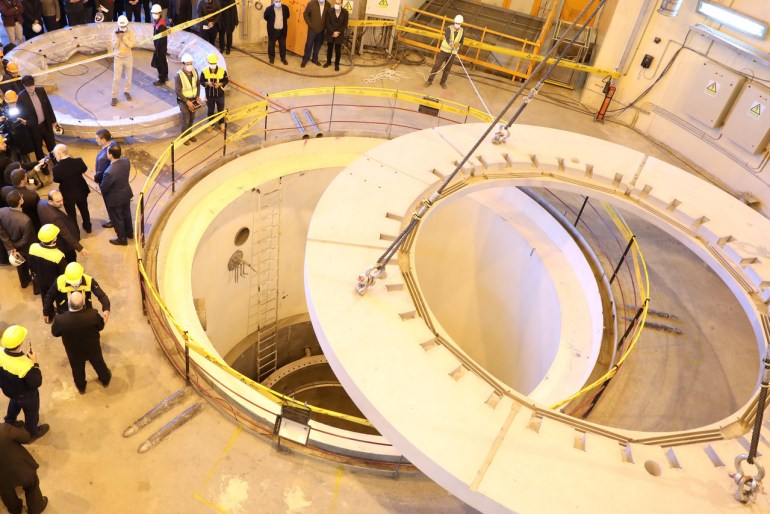An atmosphere of cautious optimism prevailed in the Iranian nuclear agreement talks, and Reuters quoted a European official as talking about progress in the course of negotiations on the basis of what was reached last June during the sixth round, which Tehran denied.
The same source said that several major issues are still open in order to reach an agreement on a final text.
Asked if the EU, which is chairing the talks, was optimistic about the position of the new Iranian negotiating team, the official said, "My impression is that we are simply progressing in a completely logical way to negotiate."
He added that there are still 7 or 8 points that need to be agreed upon in order to conclude an agreement, and that they represent "big political points."
On the other hand, the Iranian "IRNA" agency quoted a source close to the Iranian negotiating team denying what was reported by Reuters about accepting to continue negotiations on the basis of the draft talks last June.
A source from the Iranian negotiating delegation told "Tasnim" news agency that the proposals submitted by Ibrahim Raisi's government are still on the table with Western parties and have not been reconsidered.
Seriousness and discussions
For his part, Iran's chief negotiator Ali Bagheri said that Tehran is serious about negotiations and entered them in good faith, noting that Iran is the one who kept the nuclear agreement alive.
As for the Iranian ambassador, Mohsen Baharvand, said that the negotiations had cleared the "misunderstanding" about Tehran's reviews of draft texts on how to revive the 2015 agreement that imposes restrictions on Iran's nuclear program in exchange for lifting sanctions.
Meanwhile, the US State Department reported that Minister Anthony Blinken discussed by phone with his Israeli counterpart Yair Lapid several issues, including regional developments such as the shared conviction that Iran should not be allowed to possess a nuclear weapon, according to the statement.
In a related context, Pentagon spokesman John Kirby said that US Defense Secretary Lloyd Austin and Israeli Benny Gantz discussed in their meeting at the Pentagon last Thursday the military readiness to confront the common threat posed by Iran.
Kirby made it clear that there is still opportunity for diplomacy with Iran, and that diplomacy is the best way to deal with its nuclear program.
tension and effort
Meanwhile, the New York Times reported that US and Israeli officials said that the relationship between Washington and Tel Aviv had been strained over Iran, and that Israeli Defense Minister Benny Gantz and Mossad chief David Barnea had left Washington concerned that Washington might reach a "flawed" agreement. "Tehran is allowed to proceed with uranium enrichment.
The New York Times quoted informed sources as saying that the phone call between Foreign Minister Anthony Blinken and Israeli Prime Minister Naftali Bennett 10 days ago was controversial, during which the two sides adopted very different views.
For his part, Russia's permanent representative to international organizations in Vienna, Mikhail Ulyanov, said that experts are working on preparing the text of a final agreement in the Iranian nuclear negotiations.
He added in a tweet that it may take time and efforts, but the participants are working to achieve results.
Ulyanov indicated in another tweet that the negotiators in Vienna were able to clear up some of the misunderstandings that the negotiations faced at the end of last week, and began to act in practice, as he put it.
The New York Times reported that some US officials believe that Israeli concerns about concessions are misplaced.
Iran's nuclear program is a source of concern to Israel (Reuters)
Quest and explanations
In related developments, the Director of the International Atomic Energy Agency, Rafael Marino Grossi, said that the agency is seeking an agreement with Iran to re-install cameras at the Karaj facility.
Grossi added, in an interview with Al Jazeera, that not knowing what is happening at the Karaj facility prevents the agency from providing information to negotiators in Vienna.
Grossi also said that some issues need clarification from Tehran, such as the presence of nuclear materials in unauthorized places, noting that Iran's nuclear program has grown a lot, and that uranium enrichment is 60%.
And he indicated that the inspectors of the International Atomic Energy Agency had found traces of nuclear materials in Iranian sites whose presence had not previously been announced, which calls for questions to the Iranians.
He believed that saying that the Karaj facility is not a nuclear facility is an accurate description, but that this facility is a vital and necessary part of the program because it is a factory for manufacturing parts that are included in the installation of centrifuges.

